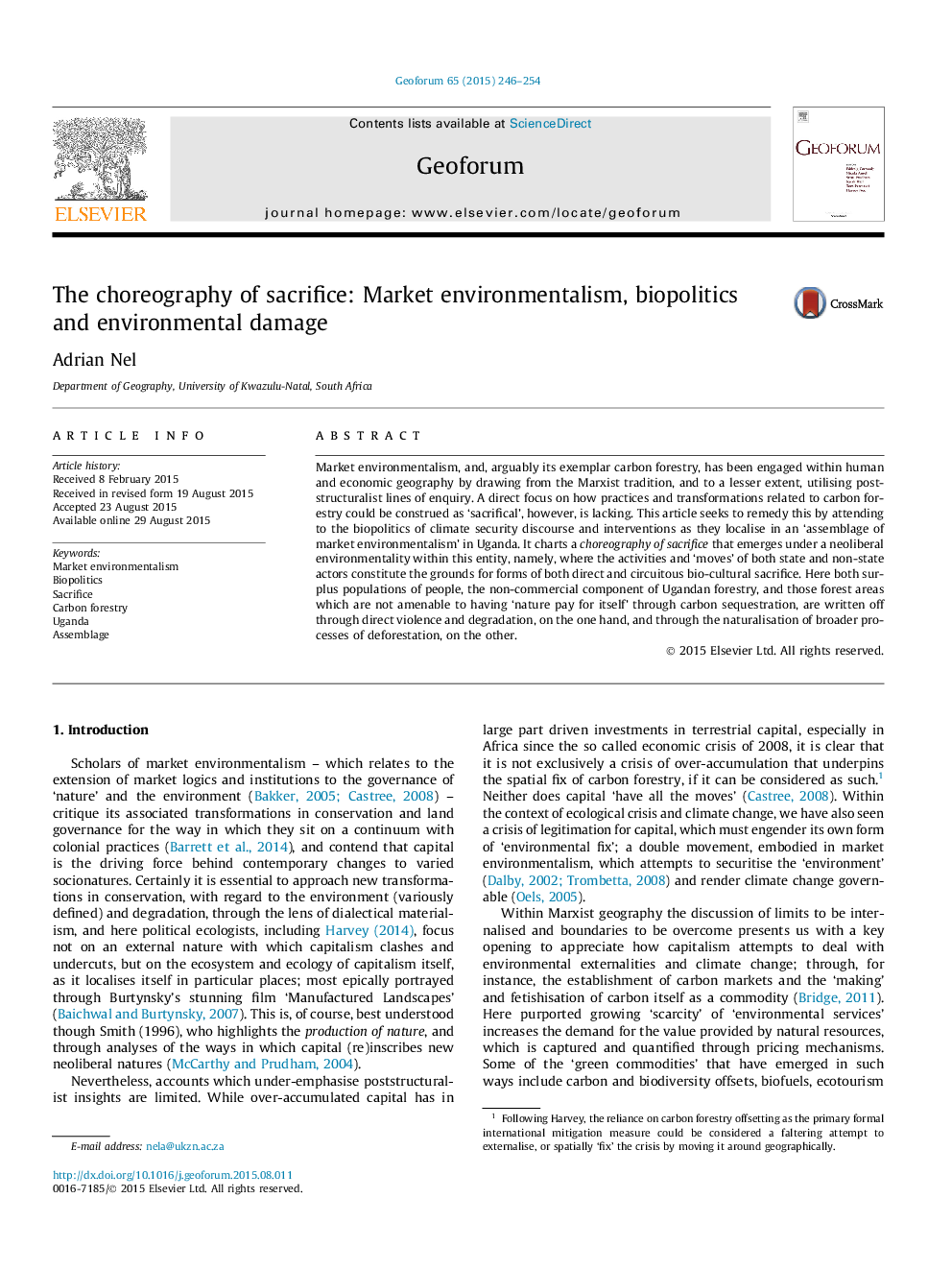| کد مقاله | کد نشریه | سال انتشار | مقاله انگلیسی | نسخه تمام متن |
|---|---|---|---|---|
| 5073809 | 1477124 | 2015 | 9 صفحه PDF | دانلود رایگان |
عنوان انگلیسی مقاله ISI
The choreography of sacrifice: Market environmentalism, biopolitics and environmental damage
ترجمه فارسی عنوان
رقابت فداکاری: محیط زیست بازار، سیاست زیستی و آسیب زیست محیطی
دانلود مقاله + سفارش ترجمه
دانلود مقاله ISI انگلیسی
رایگان برای ایرانیان
کلمات کلیدی
محیط زیست بازار، بیوپولتیک، قربانی، جنگل کربن، اوگاندا، مونتاژ
ترجمه چکیده
محیط زیست بازار، و احتمالا جنگل نمونه کربن آن، در ساختن جغرافیای انسانی و اقتصادی با استفاده از سنت مارکسیستی و به میزان کم با استفاده از خطوط پرس و جو پس از ساختارگرایی، درگیر شده است. با این حال، تمرکز مستقیمی بر نحوه رفتار و تحولات مربوط به جنگل کربن می تواند به عنوان "قربانی" تفسیر شود. این مقاله به دنبال این است که با در نظر گرفتن بیوپولتیک گفتمان امنیت و امنیت و مداخلات، آن را اصلاح کنند، همانگونه که در "جمع آوری محیط زیست بازار" در اوگاندا قرار می گیرند. این نمایشنامه یک رقصنده ی فداکاری است که تحت محیط زیست نئولیبرالی درون این نهاد ظاهر می شود، یعنی جایی که فعالیت ها و حرکت های بازیگران دولتی و غیر دولتی، زمینه ی شکل گیری هر دو قربانی مستقیم و مدون بیولوژیکی را تشکیل می دهند. در اینجا، هر دو جمعیت مازاد مردم، جزء غیر تجاری جزایر جنگلداری اوگاندا و آن مناطق جنگلی که از طریق تخصیص کربن از طبیعت برای خود پرداخت می کنند، از طریق یک خشونت و تخریب مستقیم از بین می روند. و از طریق طبیعی شدن فرایندهای گسترده جنگل زدایی، از سوی دیگر.
موضوعات مرتبط
علوم انسانی و اجتماعی
اقتصاد، اقتصادسنجی و امور مالی
اقتصاد و اقتصادسنجی
چکیده انگلیسی
Market environmentalism, and, arguably its exemplar carbon forestry, has been engaged within human and economic geography by drawing from the Marxist tradition, and to a lesser extent, utilising post-structuralist lines of enquiry. A direct focus on how practices and transformations related to carbon forestry could be construed as 'sacrifical', however, is lacking. This article seeks to remedy this by attending to the biopolitics of climate security discourse and interventions as they localise in an 'assemblage of market environmentalism' in Uganda. It charts a choreography of sacrifice that emerges under a neoliberal environmentality within this entity, namely, where the activities and 'moves' of both state and non-state actors constitute the grounds for forms of both direct and circuitous bio-cultural sacrifice. Here both surplus populations of people, the non-commercial component of Ugandan forestry, and those forest areas which are not amenable to having 'nature pay for itself' through carbon sequestration, are written off through direct violence and degradation, on the one hand, and through the naturalisation of broader processes of deforestation, on the other.
ناشر
Database: Elsevier - ScienceDirect (ساینس دایرکت)
Journal: Geoforum - Volume 65, October 2015, Pages 246-254
Journal: Geoforum - Volume 65, October 2015, Pages 246-254
نویسندگان
Adrian Nel,
